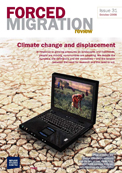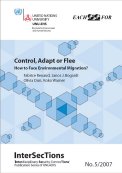Elizabeth Ferris, a senior fellow and co-director of Brookings-Bern Project on Internal Displacement at the Brookings Institution, recently presented her
take on climate change and international
displacement at a UNHCR roundtable. She discusses her contribution below:
“While there is growing interest in the issue of climate change and displacement, there doesn’t seem to be consensus about the ‘entry point’ into the debate. Many have tried to estimate the potential scale of displacement, with widely varying results resulting from different assumptions and methodologies. Others have analyzed the legal gaps, particularly for those who cross international borders because of the effects of climate change. Still others have sought to analyze the potential for increased conflict resulting from the effects of climate change.
Following on the observation by Jane McAdam and others that climate change is likely to produce different displacement scenarios requiring different policy solutions, I would like to reflect on one type of displacement which is likely to occur as a result of climate change: the relocation or resettlement of communities from areas which are no longer habitable because of environmental consequences of climate change. In particular I will focus on the relevance of experiences with development-forced displacement and resettlement (DFDR) in providing guidance for national policy-makers and international organizations likely to be involved in designing and implementing such relocations.
Although people displaced by development projects are considered IDPs in the definition of the Guiding Principles and in the new African Union Convention on Protection and Assistance of IDPs in Africa, and although there is a huge field of anthropologists and sociologists who have been working in this area for several decades, I think it’s fair to say that this field is almost unknown by most humanitarian actors working with refugees and IDPs. Planning for the resettlement of people to be affected by the construction of a massive dam has seemed very distant from the work of humanitarians setting up refugee camps to deal with people fleeing civil conflict or constructing temporary shelters for those displaced by natural disasters.
Moreover, development and humanitarian actors have different cultures and language which sometimes impedes communication; for example, the word ‘resettlement’ has very different meanings for UNHCR and for the World Bank. And yet as humanitarian agencies begin to consider the consequences of climate change-induced displacement, there are opportunities to learn from the experiences of colleagues working in the development field.”
Read the entire contribution here.



